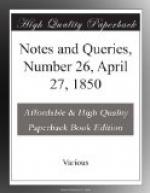Divination by the Bible and Key.—This superstition is very prevalent amongst the peasantry of this and adjoining parishes. When any article is suspected to have been stolen, a Bible is procured, and opened at the 1st chap. of Ruth: the stock of a street-door key is then laid on the 16th verse of the above chapter, and the key is secured in this position by a string, bound tightly round the book. The person who works the charm then places his two middle fingers under the handle of the key, and this keeps the Bible suspended. He then repeats in succession the names of the parties suspected of the theft; repeating at each name a portion of the verse on which the key is placed, commencing, “Whither thou goest, I will go,” &c. When the name of the guilty is pronounced, the key turns off the fingers, the Bible falls to the ground, and the guilt of the party is determined. The belief of some the more ignorant of the lower orders in this charm is unbounded. I have seen it practiced in other counties, the key being laid over the 5th verse of the 19th chap. of Proverbs, instead of the 1st chap. of Ruth.
David Stevens.
Godalming, April 11. 1850.
[In Brand’s Popular
Antiquities (ed. Ellis). vol. iii. 188-9,
it is stated that the key
is placed upon the 50th Psalm.]
Weather Proverb.—Weather proverbs are among the most curious portions of popular literature. That foul or fair weather is betokened according as the rainbow is seen in the morning or evening, is recorded in the following German “saw,” which is nearly identical with our well-known English Proverb:
Regenbogen am Morgen
Macht dem Schaefer sorgen;
Regenbogen am Abend
Ist dem Schaefer labend.
In Mr. Akerman’s recently published volume called Spring Tide, a pleasant intermixture of fly-fishing and philology, we have a Wiltshire version of this proverb, curious for its old Saxon language and its comparatively modern allusion to a “great coat” in the third and sixth lines, which must be interpolations.
“The Rainbow in th’ marnin’
Gies the Shepherd warning’
To car’ his girt cwoat on his back
The Rainbow at night
Is the Shepherd’s delight,
For then no girt cwoat he lack.”
No one, we believe, has yet remarked the philosophy of this saying; namely that in the morning the rainbow is seen in the clouds in the west, the quarter from which we get most rain, and of course, in the evening, in the opposite quarter of the heavens.
William J. Thoms.
* * * * *
BIBLIOGRAPHICAL NOTES.
1. A pleasant Dialogue between a Soldier of Barwicke and an English Chaplain; wherein are largely handed such reasons as are brought in for maintenance of Popish traditions in our English Church. 8vo. circa 1581.
This work is frequently attributed to Barnaby Rich; but from Bancroft’s Dangerous Positions, p. 42, the author is ascertained to have been Anthony Gilby.




